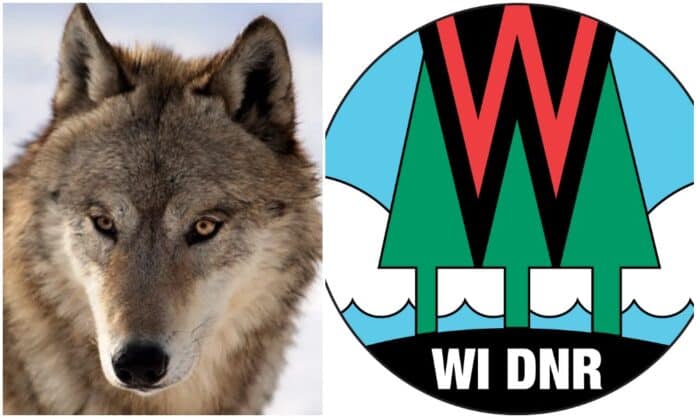The DNR’s wildlife director said he should have stopped the hunt earlier.
There’s a split when it comes to the numbers from Wisconsin’s wolf hunting season.
Wisconsin wolf hunters are happy. They shot or trapped 216 gray wolves during the three-day season this week.
The haul from this year’s wolf hunt, the first since the gray wolf came off the Endangered Species list earlier this year, was 82% above DNR’s goal.
Wisconsin’s Department of Natural Resources is disappointed.
Eric Lobner, DNR’s wildlife director, told the Milwaukee Journal Sentinel that he should have stopped the hunt earlier.
“Did we go over? We did. Was that something we wanted to have happen? Absolutely not,” Lobner was quoted as saying.
DNR wasn’t a fan of the wolf hunt to begin with. The department asked a judge to postpone the hunting season until the fall, which likely would have given environmental groups more time to try and block it in court. But the judge refused DNR’s request.
Wisconsin’s wolf hunting season was supposed to last a week, instead the state ordered the seasons closed after just two and a half days.
DNR says the vast majority of wolves were taken in the three hunting zones in northern Wisconsin, and most of those wolves were taken by hunters using dogs.
Wisconsin state law is clear, there must be a wolf hunting season if the gray wolf was ever delisted. Once that happened, the judge ruled, Wisconsin had to move ahead with the hunt.
DNR now plans to monitor the state’s wolf packs through the winter and spring. Barring any changes, there will be another wolf hunt in November.
This is Wisconsin’s first wolf season after the gray wolf was removed from the endangered species list. DNR wanted to wait until November to begin hunting and trapping, but Wisconsin law required a hunt this month.
Wisconsin’s Wolf Hunt
Earlier this month, the Wisconsin Institute for Law & Liberty (WILL), filed a lawsuit in Jefferson County Circuit Court against Wisconsin DNR Secretary Preston Cole, the Wisconsin DNR, and the Wisconsin Natural Resources Board, for failing to schedule a wolf hunt season this winter. The judge ruled that the Wisconsin DNR had to establish a wolf hunting and trapping season this month.
According to the Wisconsin DNR’s website, the grey wolf is native to Wisconsin and at one time had numbers in the 3000 to 5000 range prior to European settlement. During the 1800s, overhunting by settlers severely reduced the numbers of bison, elk, caribous and moose and almost eliminated white-tailed deer. As prey became scarce, wolves began to feed on livestock. The state legislature then passed a bounty on wolves in 1865 which continued until 1957.
Table of Contents





![Senator Ron Johnson to Speak at Concordia University [FREE EVENT]](https://www.wisconsinrightnow.com/wp-content/uploads/2024/04/MixCollage-17-Apr-2024-05-34-PM-6196-218x150.jpg)



![The COVID Generation: Let’s Stop Scaring Our Kids [WRN Voices]](https://www.wisconsinrightnow.com/wp-content/uploads/2024/04/MixCollage-16-Apr-2024-04-33-PM-2728-218x150.jpg)







![Senator Ron Johnson to Speak at Concordia University [FREE EVENT]](https://www.wisconsinrightnow.com/wp-content/uploads/2024/04/MixCollage-17-Apr-2024-05-34-PM-6196-356x220.jpg)



![The COVID Generation: Let’s Stop Scaring Our Kids [WRN Voices]](https://www.wisconsinrightnow.com/wp-content/uploads/2024/04/MixCollage-16-Apr-2024-04-33-PM-2728-356x220.jpg)


















![Why Trump’s Bond Is Outrageous [Up Against the Wall] Reduces $464M Bond Leaked Trump's Taxes Michaela Murphy Shenna Bellows Kicking Trump Off 2024 Ballot Fake Electors Lawsuit Classified Documents Trial Donald Trump Poll Documents Trial Trump’s Poll Numbers Spike After Indictment](https://www.wisconsinrightnow.com/wp-content/uploads/2022/08/trump-raid-356x220.jpg)



